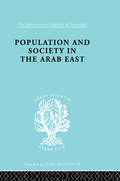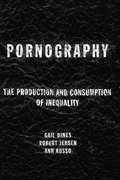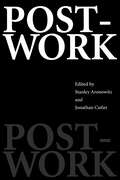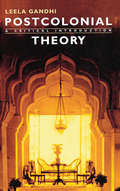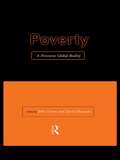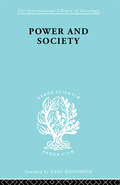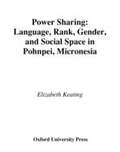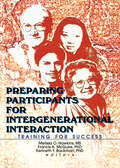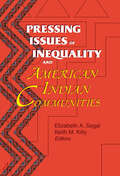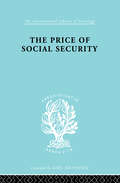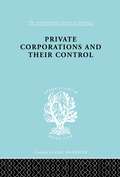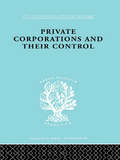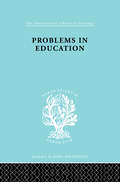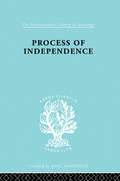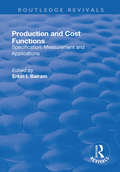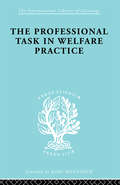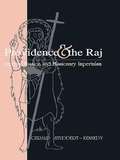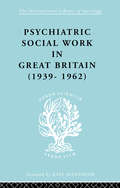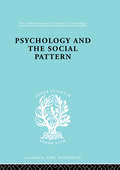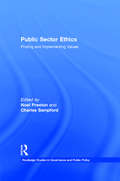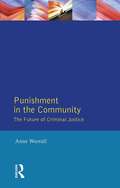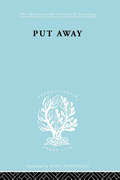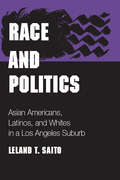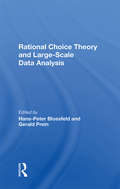- Table View
- List View
Populatn Soc Arab East Ils 68 (International Library of Sociology #16)
by Gabriel BaerFirst published in 1998. Routledge is an imprint of Taylor & Francis, an informa company.
Pornography: The Production and Consumption of Inequality
by Gail Dines Bob Jensen Ann RussoFirst published in 1998. Routledge is an imprint of Taylor & Francis, an informa company.
Post-Work
by Stanley Aronowitz Jonathan CutlerIn Post-Work, Stanley Aronowitz and Jonathan Cutler have collected essays from a variety of scholars to discuss the dreary future of work. The introduction, The Post-Work Manifesto,, provides the framework for a radical reappraisal of work and suggests an alternative organization of labor. The provocative essays that follow focus on specific issues that are key to our reconceptualization of the notion and practice of work, with coverage of the fight for shorter hours, the relationship between school and work, and the role of welfare, among others. Armed with an interdisciplinary approach, Post-Work looks beyond the rancorous debates around welfare politics and lays out the real sources of anxiety in the modern workplace. The result is an offering of hope for the future--an alternative path for a cybernation, where the possibility of less work for a better standard of living is possible.
Postcolonial Theory: A critical introduction
by Leela GandhiPostcolonial Theory is a ground-breaking critical introduction to the burgeoning field of postcolonial studies.Leela Gandhi is the first to clearly map out this field in terms of its wider philosophical and intellectual context, drawing important connections between postcolonial theory and poststructuralism, postmodernism, marxism and feminism. She assesses the contribution of major theorists such as Edward Said, Gayatri Spivak and Homi Bhabha, and also points to postcolonialism's relationship to earlier thinkers such as Frantz Fanon and Mahatma Gandhi.The book is distinctive in its concern for the specific historical, material and cultural contexts for postcolonial theory, and in its attempt to sketch out the ethical possibilities for postcolonial theory as a model for living with and 'knowing' cultural differences non-violently.Postcolonial Theory is a useful starting point for readers new to the field and a provocative account which opens possibilities for debate.
Poverty: A Persistent Global Reality
by John Dixon Professor John Dixon David MacarovThis book addresses the long-standing global issue of poverty. An introductory chapter explores concepts and definitions of poverty, the subsequent chapters providing detailed examinations of poverty in ten different countries: UK, USA, Australia, Canada, Hong Kong, Ireland, Malta, The Netherlands, The Philippines and Zimbabwe. Each chapter follows a consistent format, to facilitate comparison and focuses on the following issues:- * the socio-economic and historical context within which poverty exists * the extent and nature of poverty its causes * the measures that have been taken to mitigate it. This book will be essential reading for students of social policy and administration as well as development studies and anthropology.
Power & Society Ils 50: A Framework For Political Inquiry (International Library of Sociology #No. 2)
by Harold D. Lasswell Abraham KaplanFirst published in 1998. Routledge is an imprint of Taylor & Francis, an informa company.
Power Sharing: Language, Rank, Gender and Social Space in Pohnpei, Micronesia
by Elizabeth KeatingLinguistic anthropologist Elizabeth Keating went to the island of Pohnpei, in Micronesia, and studied how people use language and other semiotic codes to reproduce and manipulate status differences.
Prairie Town
by Bonnie GeisertDuring the early 1900s, railroad companies laid tracks across America's open land. In fields of grass beside the new tracks prairie towns grew. The towns prospered amid the golden wheat fields, and grain elevators dominated the skyline. Bonnie Geisert's clear text explores the social and economic life of one of these towns, while the dramas of everyday life can be experienced in Arthur Geisert's panoramic hand-colored etchings. Here is a fascinating view of life in a thriving midwestern town, told with respect and affection for the resilient townspeople, as they work and play, their lives directly affected by the changing seasons.
Preparing Participants for Intergenerational Interaction: Training for Success
by Kenneth Backman Melissa Hawkins Francis A McguirePreparing Participants for Intergenerational Interaction: Training for Success examines established intergenerational programs and provides the training methods necessary for activity directors or practitioners to start a similar program. This book contains exercises that will help you train colleagues and volunteers for these specific programs and includes criteria for activity evaluations. Preparing Participants for Intergenerational Interaction will help you implement programs that enable older adults to build friendships, pass down their skills and knowledge to adolescents, and provide youths with positive role models.Discussing the factors that often limit the interaction of older adults with youths, this text stresses the importance of conveying information and history to younger generations. You will learn why the exchange between different generations is crucial to society and to the improvement of the community in which you live. Preparing Participants for Intergenerational Interaction provides you with proven suggestions and methods that will make your program successful, including: examining Howe-To Industries, a program that teaches entrepreneurial skills to youths through older adults focusing on activities between older adults and youths that address aging sensitivity and racial and ethnic understanding defining the roles of a mentor, including teacher, trainer, developer of talent, and counselor increasing support and understanding in your community by defining target markets and selling the project to the public describing the aspects of group dynamics and how group decisionmaking methods are used to assess the success of the program and its volunteers understanding the community where participants live in order to address issues important to them, such as poverty and other social problems Containing sample handouts, self-evaluations, and detailed lessons for different types of programs, this book offers you guidelines that apply to participants that have a variety of needs within different communities. Preparing Participants for Intergenerational Interaction: Training for Success will enable you to help older adults remain an active and essential part of these communities by teaching youths valuable life skills they may not receive from anyone else.
Pressing Issues of Inequality and American Indian Communities
by Elizabeth Segal Keith KiltyA much-needed, indispensable volume for anyone involved in the social services or human services field, Pressing Issues of Inequality and American Indian Communities supplies you with vital information that will assist you in offering culturally sensitive services to your clients. You will gain a new perspective from the blending of traditional academic research with the voices of those most intimately affected. From Pressing Issues of Inequality and American Indian Communities, you will learn proven methods that will help you offer successful and effective services to your Native American clients.Pressing Issues of Inequality and American Indian Communities reveals the stark realities facing American Indian people today. Through this compelling book you will gain new insight into the challenges presented to Native Americans and how to help your clients face these challenges by: learning how to assist American Indian families through an increased understanding of the new time-limited welfare assistance that generally only impacts them if they live off the reservation examining how poverty and a lack of infrastructure and social services exacerbates the problems Navajo women face when leaving violence in their homes using the positive power of language through case examples of American Indian women to understand how stories and their implications change significantly depending on if they are interpreted from a deficit or strength perspectiveFrom the information in Pressing Issues of Inequality and American Indian Communities, you will gain new insight into specific problems facing American Indian people, including welfare reform’s devastating effects on American Indians trying live off the reservation and the impact of reservation isolation on domestic violence. The information in Pressing Issues of Inequality and American Indian Communities will help you provide culturally sensitive services to Native Americans and assist them in increasing their quality of life.
Price Socl Security Ils 187 (International Library of Sociology)
by G. WilliamsFirst Published in 1998. Routledge is an imprint of Taylor & Francis, an informa company.
Private Corporations and their Control: Part 1 (International Library of Sociology #Vol. 160)
by A.B. LevyFirst published in 1998. Routledge is an imprint of Taylor & Francis, an informa company.
Private Corporations and their Control: Part 2 (International Library of Sociology #Vol. 160)
by A.B. LevyFirst published in 1998. Routledge is an imprint of Taylor & Francis, an informa company.
Problems In Education Ils 232 (International Library of Sociology)
by Brian HolmesFirst published in 1998. Routledge is an imprint of Taylor & Francis, an informa company.
Process Of Independence Ils 51 (International Library of Sociology)
by Fatma MansurFirst published in 1998. Routledge is an imprint of Taylor & Francis, an informa company.
Production and Cost Functions: Specification, Measurement and Applications
by Erkin I. BairamThis title was first published in 2001. The objective of this book is to discuss specification and applications of new production, cost and profit functions. It is aimed at specialists in production, economic growth, costs, profits and applied econometrics in particular.
Profsnl Task Welf Prac Ils 188 (International Library of Sociology)
by P. NokesFirst Published in 1998. Routledge is an imprint of Taylor & Francis, an informa company.
Providence and the Raj
by Gerald Studdert-KennedyThe interconnection between British Christianity and British imperialism in India is a widely acknowledged historical fact. Despite this, there are few books which study this phenomenon. Informed by an essentially Gramscian analysis of colonial discourse, this pioneering book identifies fundamental `religious' and ideological commonalities that linked British policies in the domestic and imperial arenas and throws fresh light on the construction and collapse of the Raj.
Psych Soc Work Gt Brit Ils 264: 1939-1962 (International Library of Sociology #3)
by Noel TimmsFirst published in 1998. Routledge is an imprint of Taylor & Francis, an informa company.
Psychology and the Social Pattern (International Library of Sociology #Vol. 251)
by Julian BlackburnFirst Published in 1998. Routledge is an imprint of Taylor & Francis, an informa company.
Public Sector Ethics: Finding and Implementing Values (Routledge Studies in Governance and Public Policy #Vol. 1)
by Charles Sampford Noel Preston C-A BoisThis study, with contributions from both scholars and practitioners, examines the theory and practice of public sector ethics across a broad range of environments.
Punishment in the Community: The Future of Criminal Justice
by Anne WorrallPunishment in the Community: The Future of Criminal Justice challenges the widely held assumption that punishment through imprisonment is central to the criminal justice system. Contemporary political debate assumes that penality is synonymous with prison. However, in reality, the vast majority of people admitting to, or convicted of criminal offences are dealt with using non-custodial penal measures.
Put Away Ils 265: Institutions For The Mentally Retarded (International Library of Sociology)
by Pauline MorrisThis is Volume VI in a series of seven on the Sociology of Mental Health. Originally published in 1969, and using language of the time, this is a sociological study of institutions and hospitals for those with mental health conditions.
Race and Politics: Asian Americans, Latinos, and Whites in a Los Angeles Suburb (Asian American Experience)
by Leland T. SaitoLocated a mere fifteen minutes from Los Angeles, the San Gabriel Valley is an incubator for California's new ethnic politics. Here, Latinos and Asian Americans are the dominant groups. Politics are Latino-dominated, while a large infusion of Chinese immigrants and capital has made the San Gabriel Valley the center of the nation's largest Chinese ethnic economy. The white population, meanwhile, has dropped from an overwhelming majority in 1970 to a minority in 1990. Leland T. Saito presents an insider's view of the political, economic, and cultural implications of this ethnic mix. He examines how diverse residents of the region have worked to overcome their initial antagonisms and develop new, more effective political alliances. Tracing grassroots political organization along racial and ethnic lines, Race and Politics focuses on the construction of new identities in general and the panethnic affiliation "Asian American" in particular.
Rational Choice Theory And Large-Scale Data Analysis
by Hans-peter Blossfeld Gerald PreinThe relationship between rational choice theory and large-scale data analysis has become an important issue for sociologists. Though rational choice theory is well established in both sociology and economics, its influence on quantitative empirical sociology has been surprisingly limited. This book examines why there is hardly a link between the t
